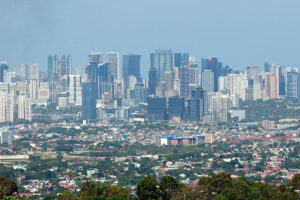
Philippines: Loss and damage fund a critical issue at COP28
By Kyle Aristophere T. Atienza, Reporter
THE PHILIPPINE environment chief on Wednesday said world leaders are expected to reach an agreement on how much money should be allocated for a proposed loss and damage fund during their climate conference in Dubai.
President Ferdinand R. Marcos, Jr. was set to leave Thursday morning for his participation in the annual United Nations (UN) climate change conference called COP28, where governments will discuss how to limit climate change and prepare for its impacts.
In a Palace briefing, Environment and Natural Resources chief Maria Antonia “Toni” Yulo-Loyzaga said a negotiation for a loss and damage fund will be one of the most critical parts of the agenda.
“After a long fight, we now have loss and damage on the agenda,” she said. “We anticipate at this point that there will be many issues relating to climate-vulnerable countries that will be addressed by this loss and damage fund.”
Mr. Marcos, 66, on Wednesday vowed to press world leaders to honor their commitments to help poor countries cut emissions and manage the impacts of climate change during the COP28.
“We are once again poised to lead,” he said. “We will use this platform to rally the global community and call upon nations to honor their commitments, particularly in climate financing.”
PEOPLE’S SURVIVAL FUND
The President was speaking to beneficiaries of the Philippines’ P1-billion People’s Survival Fund (PSF), a long term finance stream that was institutionalized through a 2012 law that amended the Climate Change Act of 2009.
The beneficiaries were six local government units that received P541.44 million to fund their climate mitigation projects under the fund.
“This milestone not only reinforces our dedication to climate adaptation, but it also signifies that for the first time, in a remarkably short period, the PSF Board has approved projects of such magnitude,” Mr. Marcos said at the turnover ceremony.
Mountain Province in northern Philippines received P271.15 million for its climate field school for farmers, while Maramag, Bukidnon in the country’s south got P126.40 million for the installation of its drainage and early warning systems.
Borongan City in central Philippines got P117.96 million for its embankment infrastructure and reforestation project, while Cabagan, Isabela received P21.28 million for its solar-powered irrigation systems. Catanauan, Quezon received P2.64 for a mangrove rehabilitation project.
Meanwhile, Mountain Province’s Besao town would soon receive P2 million for its Building Resiliency and Ensuring Food Security Project.
Mr. Marcos has vowed to put focus on the climate crisis after taking office in late June last year, asking rich nations in his debut speech at the UN General Assembly to immediately cut their greenhouse gas emissions and extend financial assistance to developing countries like the Philippines.
However, the Philippine leader has yet to declare a national climate emergency, which would authorize the government to mobilize funds to step up climate mitigation efforts.
DUBAI CONFERENCE
About 140 heads of states, governments and royalties have confirmed their attendance at the COP28, which will run from Nov. 30 to Dec. 12 at the Expo City in Dubai.
The Philippines delegation is composed of 237 people representing 16 government agencies and civil society organizations.
Ms. Yulo-Loyzaga said the themes of the Philippine participation in the conference include the pursuit of a low carbon future, nature-based solutions, and building resilient communities.
Mr. Marcos will address the Dec. 1-2 World Climate Action Summit, one of the major events at the conference, and will have “important bilateral meetings,” Foreign Affairs Undersecretary Maria Teresa Torres Almojuela said in a Palace briefing on Wednesday.
Engagements at the leader’s level are also among the highlights of the annual conference.
The COP28 leadership, led by President-Designate Sultan Ahmed Al Jaber, is set to prioritize a review of how far the international community has gone in implementing the Paris Agreement and the framework for the loss and damage fund as agreed in the last COP in Egypt, Ms. Almojuela said.
“Also high on the agenda is fast tracking the energy transition, delivering and enhancing climate finance, and of course, resilient food systems,” she added. “I believe that the president’s engagements will reflect the priority that the Philippines’ attaches to all these thematic agenda of the conference.”
On Dec. 1, Mr. Marcos will lead the opening of the Philippines’ first-ever pavilion at the annual conference. At a side event, the Philippines will push for a “stronger global consensus on the nexus between climate change and migration,” Ms. Almojuela said.
A pavilion is a dedicated space for countries and participating organizations where various events including research showcases and informal discussions with COP attendees are held.
“Following these side events, the program shifts to the central part of his visit which is the engagement with other leaders.”
After the world’s leaders have left, negotiators will remain in the summit to “hammer out outcomes,” Ms. Almojuela said.



